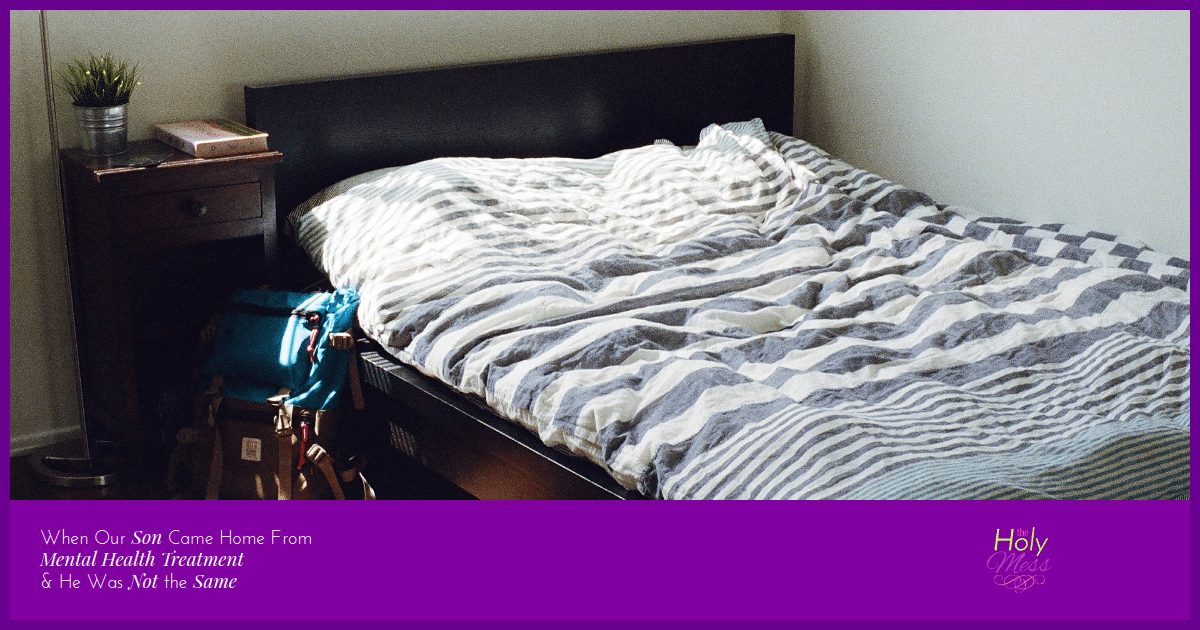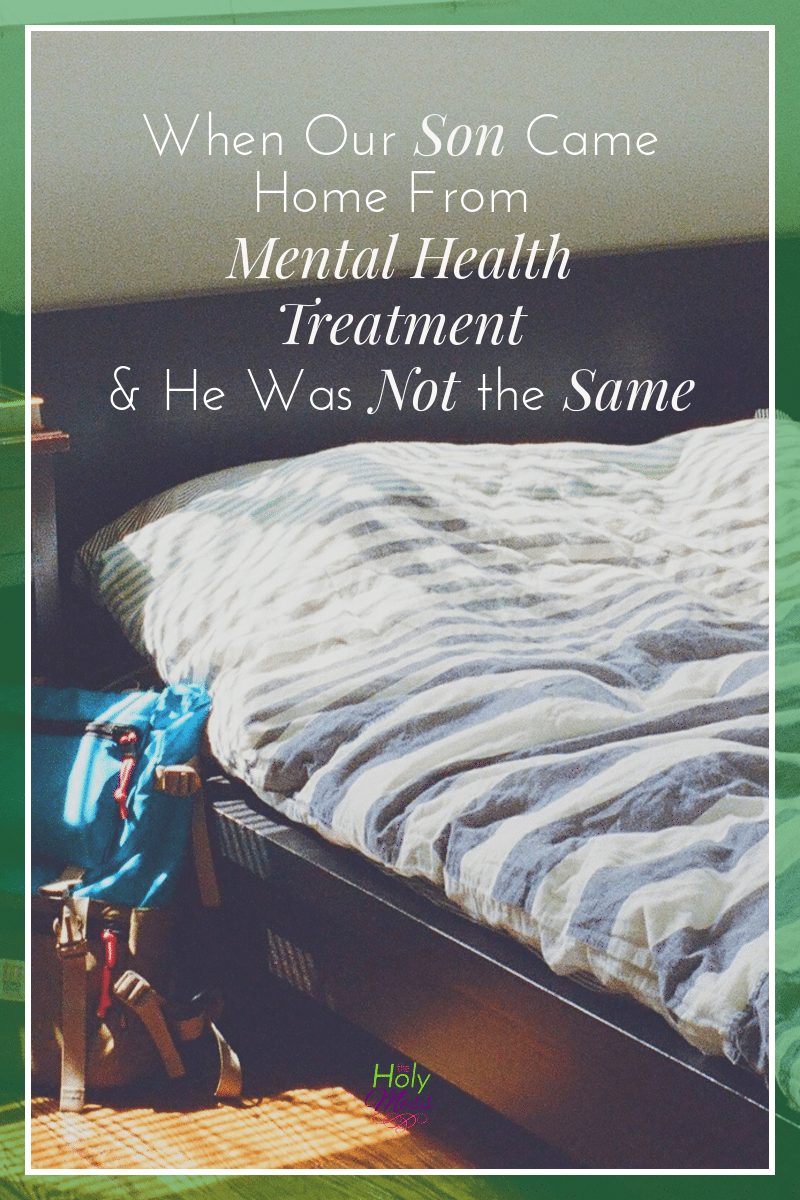When our son came home from mental health treatment and he was not the same kid he used to be, we were unprepared for how to handle it.
Although he’s only 12, our son has already stayed in a number of mental health facilities to receive treatment for his behavior and mental health issues. It’s hard to describe the mixture of emotions that these reunions produce.
- I feel intense anxiety when he comes home.
- Will he go into rages again?
- Did this treatment do any good? Did it make things worse?
- How do we rearrange our lives to accommodate the very high level of supervision he requires?
Then, there is simple joy that my baby is home. I miss him when he’s gone. Our family is incomplete and there is a gaping hole where he is supposed to be.
But when he’s away, I don’t miss the raging behaviors. I don’t miss the pacing. The yelling. The constant back-talk and never-ending negativity. I don’t miss the always-on, forever diligent supervision required of us as his parents.
(To read more about our son’s behavior and how we help him manage it, please click here: Still Standing)
Our son buzzes with a continual hum of anxious energy that is supremely draining for those of us who live with him. We don’t fully realize it until he’s out of the house for awhile, and we then find that our shoulders relax. We have whole conversations. We go places or enjoy quiet evenings at home.
A Time of Adjustment
Reunions are stressful. Sometimes there is little to no warning that he’s returning home. Just a phone call from a hospital staff member of, “The insurance won’t pay for any more. Come pick him up.”
Our son became used to the very structured way of life that a facility provides. We are a highly structured home, but we are a family. He asked us if he can go to the bathroom and wanted to tell us how long he will be in there, because that’s how it was in the facility. He’d become dependent on an adult to monitor his every waking moment.
A New Treatment
Back during the first days my son was at the facility, the had psychiatrist called me.
“Has your son every been placed on this new mood stabilizer?” the doctor asked me. “I think this could really help him.”
We agreed to allow it, and my son started the new medication. Within days we noticed a remarkable positive difference, although with visits of less than an hour a day it was hard to say for sure.
About a week before my son was to be released from the hospital, a nurse called me.
“We are starting your son on a medication for tics,” the nurse said. “We’ve noticed a few eye movements. It’s probably from his medication.”
“Tics?! He never had tics before!” I exclaimed, upset and concerned.
“It’s a pretty common side effect. You’ll need to talk to the doctor about it,” she told me. This was a doctor I had never seen, and still have never laid my eyes on. I had left him 5 messages so far that he hadn’t returned.
Sure, I’ll leave another.
Coming Home
When the time came for our son to be released from the hospital, he was on 6 different medications to be given 4 times a day. My husband called me after he picked up my son.
“Something’s different with him,” my husband said.
“Different? What do you mean, different? Like different HOW?” I demanded.
“Just different. I can’t explain it. He’s not himself,” my husband replied.
I was able to explain it after 2 minutes of my mother-eyes on him.
He was a drugged-up zombie of a kid. Nothing like the child we knew was in there.
No silly, bubbly personality. No goofy jokes at the dinner table. No singing little catches of tunes while playing with legos in his room.
No laughter.
He’d also gained 15 pounds in 5 weeks.
He’s So Calm
But he was also calm.
In years past we tried 10, perhaps 15 different medications for this child. None touched his behavior. Any one of these drugs would knock you or me under the table. He continued crashing through life as if he was on no medication at all.
Oh friends, I cannot describe to you the magnitude of this calmness. Before the medication, this is what our lives looked like:
- He raged for hours.
- Police came to our house many times.
- Our home was damaged with holes and broken furniture.
- Relationships were severed.
- We rarely took him out in public.
- He couldn’t attend regular school.
- Our other children were traumatized.
Now, he was calm.
- No rages.
- No police.
- Our home stayed intact.
- Relationships begin to rebuild.
- We could go shopping and to events.
- He was going back to school.
- We begin to heal.
But he wasn’t our boy.
Now my husband and I had a terrible, torturous parenting dilemma.
A Terrible Parenting Dilemma
We were faced with a most difficult parenting choice – do we keep him on medication that calmed him down but turned him into a shell of who he once was?
I called our outpatient psychiatrist for an emergency appointment.
“We need him off of some of these drugs. NOW,” was the first thing I said before even I sat down at her desk. She agreed but wanted to take a slow, measured approach. Going on the medications took 5 weeks in the hospital, but weaning him off would take 5 months outpatient.
I wanted him off these drugs, no matter the cost.
My husband was more hesitant. “I agree, he needs to come off of these, but look at how calm he is. We can’t go back to the rages. I just — I can’t do it anymore.”
I understood his fears. We all lived with residual trauma.
For my son, bouncing in and out of mental health facilities was no type of life. He was losing friendships, school progress, and pieces of his life he would not be able to get back.
Next Monday, part 2 of this series, When You Feel Guilt Over Parenting Decisions
More Posts You Will Love
What Life is Like When Your Child Has Mental Health Issues
Q & A with a Therapist about Depression
Do You Have Secondary Traumatic Stress?
Have you had to face difficult parenting dilemmas? How did you make a decision?

Foster & Adoptive Parents

Do you parent a child who's experienced stress, trauma, or grief?
*Foster & adoptive parents, grandparents raising grandkids, if your child has experienced trauma or loss -- this resource is JUST FOR YOU!
*FREE Super-helpful printables! 8 resources you can print and use today.
*Receive helpful updates specifically for foster and adoptive parents.







Oh, Sara, what a horrible decision. My hugs to you all
What a painful process! You are brave to share, and I appreciate your willingness! Prayers for you!
My heart hurts for you and your family–what a horrible decision to have to go through. If only there were a drug that had no side effects and actually worked and that our kids didn’t have to go throughsuch agony to find the help they need :(. Thank you for sharing your story so that others understand and expand their knowledge.